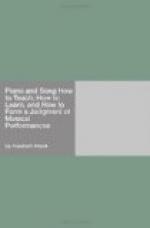Their education is a sufficiently careful one, extending to all branches of knowledge; but their intellectual advancement in music (although it has been fostered for years, by constantly listening to good music, and frequently to the performances of distinguished players, and by a critical comparison of their own performances with these) is still small in proportion to their power of execution, and to the mechanical facility which they have acquired. These are certainly essential to a correct and agreeable rendering of a piece of music: the compositions which are to be performed ought, however, never to demand the exercise of all the mechanical skill which has been acquired, for in that case, by the struggle with mechanical difficulties, only embarrassment, discouragement, and anxious haste are apt to take the place of boldness, confidence in one’s self, and command of the music. It is the duty of teachers, in choosing studies for the improvement of technique, to select only such as are within the mechanical powers of the pupil, in order that he may make steady progress, and may acquire a pure and delicate style of execution, retaining at the same time a lively interest in his pursuit. But why has the acquirement of this technique been usually unsuccessful?
1. Because you begin to acquire it too late. In order to gain facility and flexibility of the fingers and wrist (which a child in the sixth or seventh year, with a skilful teacher, may acquire in four lessons), from fifteen to twenty lessons, according to the construction of the hand, are necessary with persons from ten to fourteen years old. For other reasons also, we must urge that the mechanical facility should usually be acquired, or at least a complete foundation for it laid in childhood, and not left to be formed by a course which is destructive of all spirit, at an age when labor is performed with self-consciousness,—an age when our ladies are talking a great deal of musical interpretations, of tenderness and depth of feeling, of poetry and inspiration in playing, to which they are led by the possession of our classical piano compositions and immortal master-works, and by intellectual friends and teachers aiming at the highest culture. You reply: “But even if your mode of elementary instruction should meet with faithful disciples, how, in such young pupils, are we to find perseverance and sense enough to continue these severe exercises, even in your interesting manner?” My dear ladies, children ought to do it merely from habit, although in many cases, after the beginning, talent and correct musical instinct may make their appearance. Uninterrupted enjoyment would indeed be unnatural, and where you find it vanity will usually be its moving spring, and this seldom bears good fruit. You may as well ask whether our great literary men and artists always like to go to school, or whether they did not delight in a holiday. Let this be the answer to the strange question, Do your daughters like to play? Good heavens! After they are able to play, and that without much effort, and a little at sight; when they can master, with a musical appreciation, easy, graceful salon music, or even the easier compositions of Beethoven, Mendelssohn, Chopin, Hummel, Moscheles, &c.,—then they take pleasure in playing, and they play a great deal, and with enthusiasm.




